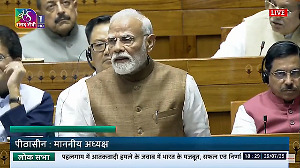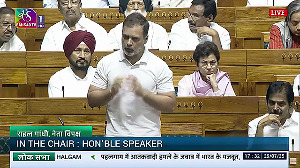There is nothing in the Constitution that prevents the outgoing government from announcing programmes and changes in tax rates in the interim Budget.

Speculation is rife about an increase in the amount allotted under the PM Kisan Samman Nidhi (PM-Kisan) and an expansion of the scheme.
The change is rumoured to be coming in the interim Budget on February 1, 2024.
This shows how the nature of the interim Budget has changed in the hands of successive poll-bound governments this century.
The interim Budget is also called the vote on account in common parlance.
However, a vote on account contains just the government's expenses, whereas an interim Budget deals with receipts and payments.
A vote on account is valid for two months, while an interim Budget is a Budget for the transition when elections are on the anvil.
The interim Budget due on February 1, 2024, will include the vote on account to ensure that the government's expenditure does not get affected in view of the Lok Sabha elections next summer.
But a lot of eyes would be watching what more it might have.
Before 2004, governments usually refrained from announcing a programme, scheme, or tax changes in the interim Budget, leaving them for the next elected regime to undertake.
The vote on account was frequently used until 2016, when the Budget was presented on the last working day of February.
In 2017, the Budget presentation date was advanced to February 1.
This gave the government almost two months to get the full Budget passed in the same financial year.
As such, the vote on account is not usually used as part of the government's budgeting process since 2017, unless in special cases such as an election year.
Not so mini
As the interim Budget provides a complete set of accounts, including both expenditure and receipts, the estimates are presented for the entire year, as is the case with the regular Budget.
The next government, which comes after elections, has the freedom to change the estimates completely when the final Budget is presented.
The practice of announcing changes in tax rates in interim Budgets was started in 2004 by the then finance minister, Jaswant Singh.
He announced measures such as merger of 50 per cent dearness allowance of central government employees with basic pay, halving of the stamp duty on central government papers, reduction in Customs duty on free baggage at international airports from 50 per cent to 40 per cent, raising free baggage allowance at those airports, and extending the Antyodaya scheme from 15 million families to 20 million (see Interim Budgets Over The Years).
These changes were made despite Singh announcing a whole set of tax modifications just about a month ago.
In January that year, in what came to be called the Mini Budget, Jaswant Singh had announced a cut in excise and Customs duties that dealt a Rs 10,000-crore hit to the exchequer.
The Vajpayee government's finance minister did not stop at making changes in tax rates in the interim Budget.
He made other promises, too, such as extending the exemption from long-term capital gains tax on shares bought after March 1, 2003, by three years, extending fiscal benefits for the power sector by six years to 2012, a reform in the tonnage tax scheme for the shipping industry, exemption from capital gains tax on farmers' land acquired by the government, etc.
The subsequent finance ministers followed in Singh's footsteps and did not revert to the old-school ways of not announcing new schemes and tax rate changes in the interim Budget.
Rising stakes
From a distance, it may seem that Pranab Mukherjee did not announce tax changes in the interim Budget he presented in February 2009 as the acting finance minister of the first United Progressive Alliance government.
However, in reply to the debate on the interim Budget, he extended the earlier reduction in central excise duty rates by 4 percentage points beyond March 31, 2009, cut central excise from 10 per cent to 8 per cent, and reduced service tax rates to 10 per cent from 12 per cent.
P Chidambaram, in his interim Budget for 2014-2015, as the finance minister of the second UPA government, cut excise duty on some capital goods and consumer non-durables, and also on two-wheelers, cars, commercial vehicles, sports utility vehicles, and mobile phones.
However, he announced some of these cuts for the period only up to June 30, 2014, and left it to the next government to take a call.
Piyush Goyal, as the finance minister of the National Democratic Alliance government presenting the interim Budget for 2019-2020, raised the pitch.
He announced a new programme, PM-Kisan, to offer an annual income support of Rs 6,000 a year to all farmer families that have cultivable land up to 2 hectares.
This hit the exchequer by Rs 75,000 crore (Rs 750 billion) a year.
He came out with another programme to provide pensions to 100 million workers in the unorganised sector.
He also gave full tax rebate to those with a total taxable income of up to Rs 500,000, increased the standard deduction limit to Rs 50,000, and raised the limit for deducting tax at source for bank interest earnings from Rs 10,000 to Rs 40,000 a year.
What the Constitution says
Former Lok Sabha secretary-general P D T Achary says it is not appropriate for a government facing elections to announce programmes and policy changes for the next year.
"The next elected government is competent to do it," he argues.
Achary also points out that there is nothing in the Constitution that prevents the outgoing government from announcing programmes and changes in tax rates in the interim Budget, while adding that it may, however, be in contravention of the constitutional scheme of things.
Vaibhav Gaggar, advocate at the Supreme Court, says neither in the Constitution nor by way of any unwritten code of conduct in Parliament (by way of general practice) is there any bar on a government presenting an interim Budget carrying tax changes and new programmes, even if general elections loom on the horizon, unless the dates of the elections have been announced and the model code of conduct has kicked in.
"Many governments of the past had come out with interim Budgets with those changes in the election year," says Gaggar.
Let a thousand speculations bloom.


Feature Presentation: Aslam Hunani/Rediff.com











